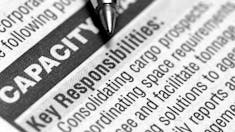Why Can’t I Find a Job?
- 10 Reasons Why You Can't Find a Job
empty
empty
empty
empty
empty
empty
empty
empty
empty
empty
- Final Thoughts
If you find yourself asking this question, the first thing to bear in mind is that you’re not alone.
Not being able to find a job becomes particularly frustrating when it seems like you’ve done everything right.
Maybe you have a solid degree but employers don’t seem to care.
Or you’re ready to move on from your current job but you can’t find that elusive next step.
It’s also discouraging if you often get far into the process – past assessment centres or into final interviews – but don’t quite make it.

It’s a tough job market out there and, in most cases, it’s a numbers game. Highly qualified, excellent candidates are overlooked for positions all the time, because there are plenty of other excellent candidates too. You just need to keep trying.
With that said, there are some practical steps you can take to improve your job prospects; it all begins with assessing the problem.
By looking at where the issues with your approach to job hunting might lie, you can take steps to fix them. In many cases, simple changes can make a world of difference.
10 Reasons Why You Can't Find a Job
So, here are ten common reasons why you might not be having much luck finding a job and some solutions to each:
1. You’re Overqualified or Underqualified
It’s important to be realistic about what jobs you can do. If all the jobs you’re applying for state that they require three to five years’ experience and you’re fresh out of university or only have one or two years’ experience, then that’s likely to be a significant factor.
It can be a good idea to apply for jobs you might be a little bit underqualified for on paper – ambition is always good and sometimes it can give you an unexpected leap in your career – but don’t rely solely on it.
Getting rejection after rejection (or, as is more likely, no response) is just going to be discouraging and a blow to your confidence and morale.
At the same time, don’t undersell yourself. Being overqualified might not seem like an issue, but from the employer’s perspective, an overqualified candidate is more likely to become bored and leave quickly.
In any case, you should be aiming for a job that pushes your limits and stimulates you, not least of all because those jobs are more likely to have better pay and better career prospects.
Read job adverts carefully and realistically compare the requirements to your CV. If you’re fresh out of university you should probably be looking primarily for positions labelled ‘graduate’ or ‘trainee’ or ‘internship’. These jobs won’t require industry experience.
If you’ve worked in an industry for a couple of years, you should avoid those entry-level positions as you’ll be overqualified. Instead, look for positions that require around one to five years’ experience.
2. You’re Looking in the Wrong Place
There are thousands of job-hunting websites, and that’s before you consider the job opportunities that can be found through social media, networking, newspapers and so on. It’s very easy to just stick to the handful you’re most familiar with.
That’s a mistake. Just as you have your preferred websites or services, employers do too. If your preferences don’t line up, you won’t see all the opportunities certain companies are offering.
Some industries also have their own industry-specific job advert sites, such as the Working for an MP board for jobs in UK politics, or eFinancialCareers for jobs in finance. A few companies also only post openings on their own vacancies page. If you’re only looking at certain job boards, you might miss these opportunities.
So, remember to cast your net wide. If you aren’t seeing many vacancies for the kind of job you’re looking for, then try another site. And always do some digging for industry-specific job boards.
If you don’t want to constantly flick between many different sites, consider setting up job alerts on all of them that will email you when a relevant vacancy goes live.
3. You’re Not Standing out in Your CV and Covering Letters
Your CV and covering letter are a vital first step. They’re the first impression an employer gets of you so you need to fine-tune them – both to the industry generally and to the job – to stand the best chance.
If your problem is that you simply aren’t getting many replies and aren’t making headway into the application processes, then it might be that your CV and covering letters need to be reviewed.
4. Your Applications Aren’t Tailored
When you’re applying for numerous jobs and not getting many responses, it can be easy to believe you’re saving time by creating a one-size-fits-all application and sending it to every relevant position.
But that approach is actually counter-productive. Sending a generic application makes you far less likely to be successful. Employers receiving many applications will naturally lean towards the ones that show a specific and genuine interest in their company and in that job.
That means that, while it’s fine to have a template CV, covering letter and application materials, make sure you repurpose it for each position you apply for. Make it clear you’re applying for that job, not just any job.
5. You Keep Falling at the Interview Stage
The job-hunting process can be particularly frustrating when you keep getting to final interviews; the end is in sight but you are never quite getting the role.
If this sounds like you, then you might need to practice your interview technique. That sounds obvious, but there are key steps that you can take to improve your interviewing.
The key, as always, is practice, but specific practice is better than random practice. Look up common interview questions and practice them with friends and family. Get them to tell you honestly how you come across and how you might do better.

6. You’re Losing Motivation
Long, drawn-out job searches are exhausting, demoralising and frustrating.
This becomes a vicious cycle in which low motivation and morale cause your applications to be weaker than they otherwise would have been, leading to more rejections and more frustration, and so on. You’re not alone in feeling like that.
It’s important to do what you can to keep your spirits up and to make sure you don’t lose hope.
One way of tackling this is to set goals. While the overall goal is, of course, to get a job, you should set yourself intermediary goals to give you some sense of achievement along the way.
A good way of doing this is to set a target number of jobs you want to apply for per day. That way, writing all the applications in a day is an accomplishment in itself, without success riding only on whether you get the job or not.
7. You’re Not Networking Effectively
While digital solutions to application processes have greatly changed how things work, there is no replacement for good networking.
While this can be done through work-focused social media like LinkedIn, in-person is even better. If you’re able to, attend industry events, conferences, talks and so on. These kinds of events are a fantastic chance to meet people with a huge amount of knowledge and contacts in the field.
It’s unlikely they’ll be able to offer you a job, but if you approach them professionally and politely, they’re likely to have some useful advice or possibly even contacts for you.
8. Job Hunting Isn’t Taking Enough Priority
When job hunting, you should treat it like a job. Get up early, grab a coffee and start. It should be the number one priority of your day, and it should consume most of your day, assuming you don’t have more pressing responsibilities (such as caregiving).
It’s a competitive job market and, as previously said, it is largely a numbers game. You need to take the time to seek out relevant jobs, write tailored applications and follow up on applications in progress.
To do all that for enough applications to have a good chance at getting a job takes a significant amount of time and shouldn’t be underestimated.
9. You Don’t Address Potential Issues in Your CV
If you have a large gap in employment, are applying for jobs in a field unrelated to your qualifications or have something in your CV that might make an employer raise an eyebrow, it needs explaining.
There are perfectly valid explanations for many potential issues, such as gaps in your CV, but you will need to write that explanation in the covering letter or at the earliest opportunity. Otherwise, employers are unlikely to take the risk.
Of course, you don’t need to go into an excessive amount of detail. Something like “Due to serious family issues, I was unable to work for this period” is fine.
The same goes for having multiple jobs that haven’t lasted for more than a few months. An employer might see this history as indicative of a flighty person, but there are many valid reasons why someone – particularly a student or recent graduate – might have such a career history.
If the issue is more along the lines of a drastic shift from what you’re qualified for (such as a science graduate looking to go into a creative role), then make sure to explain why it is you want to shift, why you think you’re still qualified and what advantages your background might bring to the role.
10. Your Applications Are a Little Sloppy or Careless
Small errors and typos can easily crop up in applications, particularly when you are writing quite a few at a time.
But mistakes will make a difference and leave a poor first impression. If your spelling and grammar are sometimes sloppy or you have odd formatting issues, it’ll come across badly.
Take the extra time to proofread every application you send. It’s also very worthwhile to have a friend or family member read over your materials to check, even if your English is excellent.
Final Thoughts
There are plenty of other reasons why you might not be able to find a job. Poor luck is probably the most common. But, hopefully, some of these ten points might help you to target the parts of your applications that are letting you down.
Job hunting is a process best done through constant, small improvements. A better covering letter here, a more fluid interview there, a higher aptitude test score and so on.
Small improvements will slowly build you into an even stronger candidate.
Most of all, don’t panic. Searching for a job can easily begin to feel hopeless, dehumanising and demoralising.
Just remember that, in most cases, you not getting the job is not a reflection of your own abilities. Someone else just happened to suit the role slightly better, got on better with the interviewer or, maybe, caught them in a better mood.
In the meantime, keeping a critical eye on yourself and the quality of your applications will give you ever-increasing chances. Go through this list and ask yourself honestly whether any of them might apply to you.






